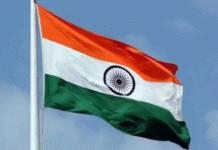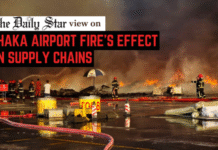March 26 is a very important day in the history of Bangladesh. It is celebrated as the Independence Day of Bangladesh although the true liberation of the country came some nine months later in 16 December, 1971.
I was a high school student studying in a cadet college. Our school was closed sine die on March 8, 1971 – a day after Sheikh Mujibur Rahman had delivered historic speech in the Ramna Race Course of Dhaka (now the capital city of Bangladesh) where he called a nationwide strike and launched a non-violent non-cooperation movement against the Government of Pakistan. His party – the Awami League – had won 160 of the 300 National Assembly seats (all from East Pakistan) contested in the parliamentary election of 1970, and was supposed to form the government. But the military regime of General Yahya Khan with the backing from the People’s Party of Zulfiqar Ali Bhutto, which had won only 88 seats (all from West Pakistan) in the election, won’t hand over the power to Sheikh Mujib.
The 1970 national election result was a big surprise to the military regime. In its worst nightmares, it probably never imagined Sheikh Mujib’s East Pakistan-centric party (the Awami League) to win with a simple majority (all but two seats from East Pakistan). The military junta had falsely assumed that a coalition government would emerge, which would allow the military to maintain its sway over the political developments inside the country. The election result was, therefore, shocking and unacceptable to the ruling regime. In this, it perceived a divided country separated by a thousand miles of hostile India. It did not want to accept the mere fact that years of domination from West Pakistan had already alienated the people living in the eastern wing of Pakistan. As a matter of fact, since August 14, 1947 when Pakistan gained her independence from British India, the political elite (which also included military) from the western part of the country had been ruling the country for all but two years (1956-58). It is worth noting here that in those years, the Bengalis living in the East Pakistan comprised the majority (54%) of the population of Pakistan.
Years of negligence and discrimination from the central government, which had spent less than 29% of its budget in East Pakistan, had made Bengali nationalism the rallying ground for most Bengali speaking people to support the political agenda of the Awami League, led by its charismatic leader Sheikh Mujib, fondly known then as the Bangabandhu (the Friend of Bengal). The party participated in and won the 1970 election with a Six-point formula, promising regional autonomy to the federating units so that political, economic and social aspirations of its Bengali speaking people would be met under a federal system of government.
Instead of convening the National Assembly session on March 3, 1971 and handing over power to the majority Awami League, the Pakistani President General Yahya Khan indefinitely postponed it, thus, precipitating massive civil disobedience in East Pakistan. Within weeks hundreds of demonstrators and supporters of the Awami League were killed by the police, further worsening the situation.
In his speech at the Race Course on March 7, 1971, Bangabandhu declared a four-point demand to consider the national assembly meeting on March 25, 1971. These were: (a) the immediate withdrawal of the martial law; (b) immediate withdrawal of all military personnel to their barracks; (c) an inquiry into the loss of life; (d) immediate transfer of power to the elected representative of the people before the assembly meeting of March 25. In spite of much pressure from the hawkish elements within the student groups, he resisted the temptation to declare secession of East Pakistan (Bangladesh) from Pakistan.
Sheikh Mujib further strengthened his position by issuing 35 directives for the management of East Pakistan on March 15. On March 16-24, Mujib, Bhutto and Yahya held a series of meetings, which appeared to give the impression of attempting to forge a compromise. As the negotiations proceeded, the country was extremely tense. When an army ship – MV Swat – full of ammunition docked at the port city of Chittagong in East Pakistan on March 18, hundreds of thousands of Bengalis blockaded the port to prevent it from being unloaded. The deployment of West Pakistani soldiers and the shipment of arms and ammunitions meant that the central government was not serious in resolving the constitutional crisis peacefully and was using the so-called negotiations as a ploy to misdirect attention. Student leaders within the pro-Awami League Students’ League raised new flags for Bangladesh and demanded that Sheikh Mujib declare independence. But Mujib, warned by his wise policy advisers, did not want to give the military regime an excuse to try him and his party leaders for committing treason against the state. As such, he stuck to his demand and continued negotiations.
In my neighborhoods along Zakir Hossain Road in East Nasirabad and south Khulshi, Chittagong, I could see college students taking para-military type training without guns and rifles. Fearing military incursion, they put up barricades on the streets. They were ready to lay down their lives when and if Bangabandhu declared independence.
In our upscale neighborhood, many non-Bengali merchants and jute mill managers and owners lived. Fearing undue violence, which might ensue any time, my father and some of his elderly friends formed peace committees and ensured that everyone’s life and properties would not be threatened by any troublemaker.
Then came the fateful night of March 25, 1971 when perhaps thousands of Bengali-speaking East Pakistanis were killed in Dhaka and Chittagong by Pakistan Army. Rumors circulated late at night that General Yahya Khan had ordered the arrest of Bangabandhu and some of his aids before flying back to Islamabad. In Chittagong, thanks to border security forces of East Pakistan Rifles, reporting to Major Rafiq, the city with its seaport was still under control of local Bangladeshis and the military cantonment in Sholashahar, within walking distance from my home, was surrounded by them. It was said that more than a thousand new army recruits from East Pakistan were killed while they were asleep in their barracks by the West Pakistani non-Bengali forces. Included amongst the casualty was an East Pakistani colonel – M.R. Chowdhury. No one seemed to know the whereabouts of another high ranking East Pakistani Brigadier Majumdar.
On March 26, I saw a cyclostyle copy of the declaration of independence made by Bangabandhu, which was apparently received by Captain Moslem (a Bangladeshi) of the Signal Corpse of Pakistan Army – who was our neighbor. This documentation is exactly similar to the one which later came to be known as the Independence Declaration of Sheikh Mujibur Rahman.
In the late afternoon of March 26, I walked towards Sholashahar and witnessed rifle-carrying para-military forces of Ansar surrounding the home of a Urdu-speaking manager or owner of a jute mill who reportedly had shot at the crowd on the street. To get him out of his house, some people threw fire-bombs at his well-protected concrete home. It was a disturbing scene for me to watch and I returned home.
In those days of late March, with the reports of killing of Bengalis, esp. in Dhaka, by the Pakistan Army circulated, there must have been a lot of violence directed against Urdu-speaking Biharis (Urdu-speaking Muslim refugees from the state of Bihar in India who had fled to East Pakistan after the partition of India), who were perceived to be pro-Pakistan and against Bangladesh. But I did not personally see any such violence in the violent months that followed. Our mixed neighborhood was free from any such violence.
My sleep on the night of March 26 was cut short by sounds of mortars, reportedly fired from the Patenga and Halishahar port areas by the stranded Pakistan Navy and Army. I remember taking shelter in the bathroom with my sister. The next day, I discovered an unexploded mortar shell that had landed the night before in my neighbor’s yard. Rumors also circulated about the existence of a Free Bangladesh Radio Station, operating from Chittagong, and we were later able to listen to the declaration made on behalf of Bangabandhu by Major Zia, a Bengali officer who had joined the (rebel) liberation forces.
The rifles and guns of the Bengali-speaking police, Ansar and EPR were no match against the superior fire powers of the Pakistan military, and within days by end of March, the once barricaded Pakistani forces were able to come out of their barracks and retake the entire city. Fearing harm, we quickly brought down a huge boat – the symbol of Awami League – which was visible from the road and had been hanging for months from the roof our 3-story house ‘Prantik’. From the roof top we could witness the surrender of the lightly armed Ansar, police, and Rifle (liberation) forces to highly armed Pakistan Army and Navy, who came in tanks and armored cars hoisting Pakistani flags. We could also see jet fighters and bombers of Pakistan Air Force flying in the sky. In our home, we fed and clothed many fleeing members of the resistance force so that they could hide from and leave undetected by the Pakistan military. Some fighters, afraid of carrying their rifle any more, buried it in our backyard. In our home, we also treated some bullet-injured members of the Ansar and the EPR.
Rumors about and fears of massacre created such a panic that many city dwellers started fleeing from the city. Later we heard that many of them did not make their way to safe havens, but were killed on the Trunk Road going out of the city. In our neighborhood, a doctor was reportedly killed by the Pakistan Army. For days, I could smell of dead corpse for no one had dared to venture out to bury the corpse.
In early April, soon after the takeover of Chittagong, the military imposed curfew in the city with a short break of only an hour or two for people to buy their food and medicine, or attend to business. It was very dangerous going out of home. [In those days, quite a few of our family friends, which included the Chairman of Port Trust, had disappeared, and no one had heard from them ever since. They were probably summarily executed and their bodies dumped or buried in some unmarked grave.] My father, however, wishing to find out about the whereabouts of his friends, neighbors and relatives would go out ignoring my mother’s protests about the danger that waited outside. [Some of his friends, in their haste to leave the city, had left their home doors and cars unlocked. In those days cars were a luxury and vulnerable items for getting picked up by the military unless put inside the garage. Similarly, homes could be robbed of all the valuables.]
And my mother was right. In one such trip to my cousin’s home in Agrabad, my 9-year old sister and I accompanied him and one of his friends in our car. When we had just crossed the Dewan Hat area, not too far from the commercial center of Agrabad, a military jeep commandeered our car to its camp in Tiger Pass. Soon we were taken to a room and Captain Rizvi, a Urdu-speaking officer who lived in our neighborhood in the same building where Bengali-speaking Captain Moslem had lived, showed up. He started screaming, “You are Awami Leaguers,” “miscreants,” “traitors,” and “you must be killed.” Realizing probably our tender young age, he let me and my younger sister leave. He and his orderly corporal took my father and his friend outside the room near a tree with the intention to execute them.
As we two walked towards the gate, and my sister crying greatly, we noticed a jeep approaching the military camp from outside. A senior ranking air force officer stepped out of the jeep and inquired why we were crying.
When I explained what had happened, he said, “Do you know how many Urdu-speaking people were killed by your Bengalis?” I told him that such information was news to me since in our area no such violence had happened, and that my father ought to be credited for the peaceful coexistence; and that if he wanted to verify about my father’s role, he could contact our next-door Urdu-speaking neighbor, or others. I told him that he could contact Wing Commander Sulayman Kayani, my cadet college principal, to learn more. He said that he could take me to parts of the city where many Biharis had lived and show scores of shoes of two- and three-year old girls that were murdered by Bengalis. I was simply shocked and told him that I was very sad to learn the nature of violence perpetrated by people of my own linguistic group against another group. He told us that he would talk to Capt. Rizvi and stop the execution.
Rizvi, probably having seen the high ranking officer talk to me, did not carry out the execution. My father later told me that the officer stopped the execution and inquired about why he was brought into the camp. He then called my father and apologized for Rizvi’s rudeness. Apparently, Rizvi was upset that Capt. Moslem, who shared the same house and lived upstairs, had deserted Pakistan Army and joined the liberation force. The Air Force officer told my father to collect the latest information about Moslem and report back the next day before noon. We were all relieved to dodge death. However, the curfew time imposed in the evening was approaching fast, and we were afraid that if we did not make it to our home by driving fast within the next five minutes, we might be violating the curfew and could be shot at on the street. We arrived home in the very nick of time.
My mother and other two siblings were very worried that we had left my cousin sister Reena’s place in Agrabad nearly an hour ago and had not returned. They were relieved to see us return alive. But when my father told everyone that he had been asked to report back the next day, it was a panicky moment. If he did not report, the military could come to our home, which was well known to them and kill everyone. If he reported, what’s the likelihood that he would return alive again? The Urdu-speaking good neighbor of ours suggested that my father report back, giving us the hope that “InshaAllah, nothing would go wrong.”
Later I learnt from my father that it was a very wearying night for him. He had not slept the entire night. He decided to report back the next morning. My younger brother accompanied him to the military camp. My mother prayed for their safe return. Fortunately, as my father’s car approached the gate of the camp, the good-natured Air Force officer was in a hurry and about to leave for the airport to receive a very high ranking general. When my father told him that he had no information on Capt. Moslem, the officer told him that if Moslem was inside the country they would find him. He then told my father to go home, and again apologized before stepping in his jeep. If my father had missed that Air Force officer, he would have found the trigger-happy Capt. Rizvi awaiting him. And God knows, what could have happened!
After returning home, within days my father decided that it was no longer safe for him to live inside the city, and he moved away to rural areas to finance and help the liberation movement.
When the time for the SSC and the HSC examinations came, all the cadets were summoned to appear at Mymensingh Cadet College in Mirzapur. I decided not to go. Instead, on the suggestion of a freedom fighter in our locality I decided to collect information on the war from various media sources, including the BBC. The information was used for boosting the morale of the freedom fighters, who by then were showing some success against the military and their local agents.
In our home, we gave shelter to two other families who were afraid to live in their own homes. One was the family of my childhood home instructor – Hari Sadhan Das, a college professor. He and his wife lived with us for the entire nine months of the liberation war. From August onward, after the first batch of India-trained freedom fighters had returned to Bangladesh and started ambushing Pakistani forces, our home provided shelter to three freedom fighters. The first of these, Rafiq bhai, a student at the Commerce College, died in a gun exchange with the Pakistan Army on November 1 in front of City College. One of his friends brought the sad news to us, and we cried. Although he was not a relative, he became more like a cousin brother to me and my siblings.
To be continued>>>
Source: Asian Tribune










